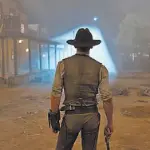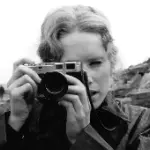Here's my two cents on "Poor Things" One thing that really let me down was the way the characters were painted - so stereotypical that it made the movie come off as pretty surface-level.

Take Godwin, for example. This guy can create life, and not just that - he also radiates this motherly warmth, because hey, who else but mothers can bring life into the world, right? Here's a little detail that struck me: when Bella wants to leave, Godwin doesn't stop her. Instead, he hides a ton of money in her clothes. There's this strong vibe of motherhood and love that's given to him, turning him into this caring and loving father figure.

Then there's Duncan, who's like the lost son we see in old tales. He's into Bella, a woman with a mature body but a soul that's still innocent and easily swayed. Duncan's kind of a sad character but not really harmful. Even when Bella takes all his money and they end up with nothing, he never even thinks about selling her out. He's more comic relief than anything else.

And let's not forget Bella’s ex-husband, General Alfie, who's another stereotypical character. This guy's a mad and violent dictator, but the threat he poses is nothing more than a kid's. He's basically a prankster who treats his gun like a toy and gets a kick out of scaring people. But in the end, he's easily defeated by Bella, transforms into a harmless creature, and just goes about his life. The movie paints patriarchy through these male characters as something laughable, not really scary.
The female characters in the film also strike me as intriguing.
Madame Swiney is a capitalistic witch who spouts old-fashioned, clichéd words and if you can't change her behavior, you might as well enjoy it. She is a typical example of an alienated woman in an environment of sexual exploitation. Her so-called advanced and bold discourse is nothing more than a weak tranquilizer for women who are about to suffer and have nowhere to go. Portraying her as a spiritual mentor to Bella on the latter’s awakening journey further simplifies and even distorts the meaning of women's self-liberation.
Toinette, a black woman who is also a prostitute, is completely like a tool. She seems to be a mirror that gives Bella an additional dimension. For example, she provides Bella with sexual pleasure, praises her, and arouses her curiosity about the latter’s own past. But who Toinette is, what she likes, what she advocates, we have no idea. Her complete lack of self-subjectivity fulfills Bella's subjectivity when Bella faces her.

And as for Felicity, Bella's successor, which mind is changed into is not explained in the film at all. The film reaffirms Bella's uniqueness as a successful product with Felicity's foolishness and mediocrity.

I thought the noble old Madame Swiney on the ship would play some important role, like inviting Bella to travel around the world with her girl friends, thereby inspiring Bella. However, apart from making some seemingly disdainful remarks about men, she does not have a substantial impact on Bella's actions and her ensuing encounters.
Bella does not gain substantial inspiration and experience from these female characters. Every time new knowledge is brought to Bella in the movie, it seems to be a man who does so. It's Max who breaks into her world and teaches her the concept of marriage and gender; it's Duncan who guides her the way to the outside world after eloping with her; it's Astley, her cynical black male companion, who shows her the "real world" and evokes her thoughts about poverty. It's always man…
Bella’s character design is also outrageous. If she is described as a child, then according to child psychology, when she sees never-before-seen and unheard-of things like slums, her first reaction should be curiosity/surprise/fear and confusion. However, Bella does not cry sadly when she first encounters the slums, as if she understands the cruelty of the world. The process of every of Bella’s change and realization is not shown, only the outcomes are. How her personality develops, how complete it is, there are no details; it is extremely abrupt.
It seems that as long as you have been with enough men, you can understand the world. This is the opposite of my understanding that personality development requires as many experiences as possible.
More importantly, Bella seems to be shuttling between different cities, but in fact, she has always been confined to spaces governed by different men.

Bella is initially trapped in Godwin's house and is raised and watched by him. Later, she is kept next to Duncan and travels to multiple hotel rooms. Occasionally, when she goes out for a walk, his fear of losing control of her gets triggered. Then, he puts her in a suitcase and brings her onto a boat, but they both end up stranded at sea. In the movie, she strolls in Lisbon for the first time and sees the sky and the city.

She subsequently experiences vomiting due to hypoxia. Later in Paris, she does not go on city walks to explore places but gets trapped in a brothel. There are very few outings, and she just attends anatomy classes. There is no depiction of what she experiences in the city outside of class hours. Besides her clients and "sisters" in the brothel, the film does not describe who else she meets. Later, she is imprisoned in General Alfie's mansion. Just when I thought she was going to escape to see the world and the movie was going to have an open ending, she returns to her loving father.
The last shot is her in a victory posture in her enclosed courtyard. What kind of victory has she achieved? I don't understand.

After watching this two-hour movie, I still can't understand who Bella is. She is better than Victoria, the previous owner of her body, who jumps off the bridge at the beginning of the movie. She is more like a real person, and a woman who really lives in the Victorian era.
If the female characters that a feminist movie with profound connotations creates are only flesh and blood, I think it is either too sci-fi for me to understand, or too outdated and shallow for my liking.















































Share your thoughts!
Be the first to start the conversation.